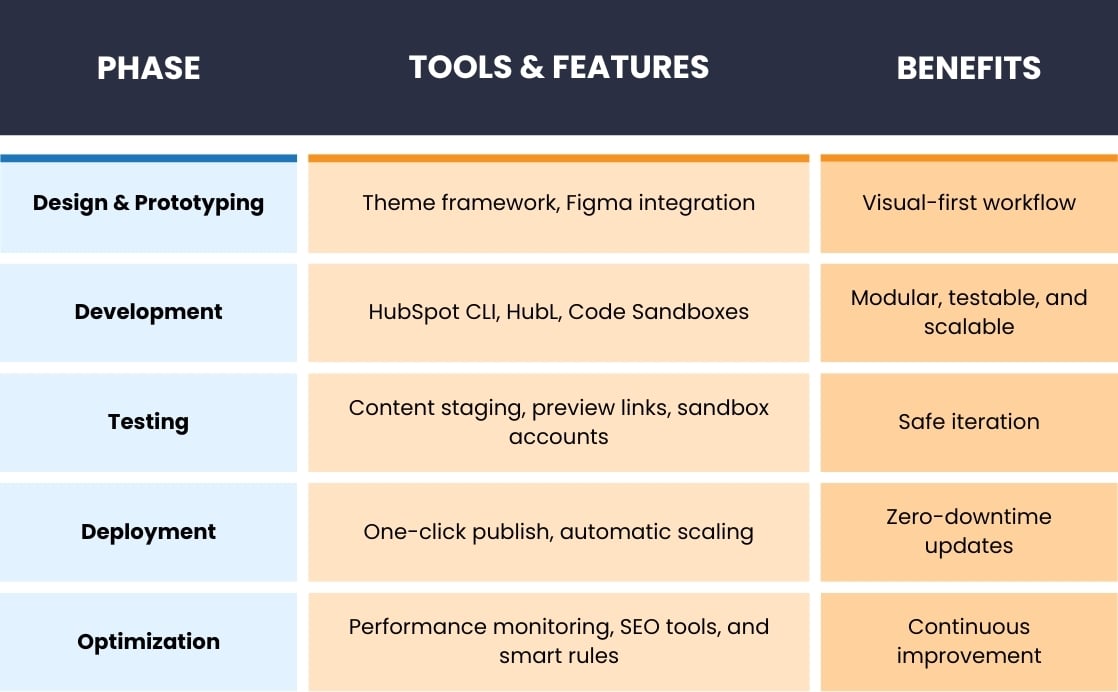Why HubSpot CMS is the Future-Proof Choice in 2025
.png)
In 2025, website development will be about more than aesthetics; it will also involve scalability, performance, personalization, and seamless integrations. HubSpot CMS is the go-to solution for developers and businesses seeking a unified, secure, and growth-ready digital experience platform.
This blog is your developer friendly and business-leader-accessible deep dive into what makes HubSpot CMS technically robust and how it empowers teams to build lightning-fast, scalable websites without compromising marketing flexibility or security.
1. Understanding HubSpot CMS Architecture
Serverless & Secure by Design
HubSpot CMS is a SaaS-based CMS hosted on HubSpot’s global infrastructure. Unlike traditional CMS platforms that require server setup and maintenance, HubSpot removes the burden of hosting, patching, and scaling.
Core Benefits:
- Serverless deployment (fully managed hosting)
- Global CDN (Content Delivery Network)
- ISO 27001, SOC 2 Type II, and GDPR compliant
- Automatic scaling and threat detection
Flexible Templating with HubL
HubSpot’s templating language, HubL (HubSpot Markup Language), allows developers to create modular templates using:
- Drag-and-drop areas for marketers
- Custom coded modules for developers
- Theme based structures for reusability and consistency
This blend gives developers complete control while allowing marketers to update content independently, bridging two traditionally separate teams.
Built-in Developer Tools
Developers can use the HubSpot CLI (Command Line Interface) and integrate workflows into their local dev environments (with GitHub, VS Code, etc.) for:
- Local template/module development
- Staging environments
- Version control & collaboration
2. Why Developers and Businesses Trust HubSpot CMS for Scalability
Performance by Default
Websites on HubSpot CMS are lightning-fast out of the box:
- Server-side rendering with cache optimization
- Automatic image optimization & lazy loading
- Minified CSS/JS and HTTP/2 enabled delivery.
Content Hub: Structured Content Meets AI Power
With the new Content Hub in 2025, HubSpot now supports:
- Content Modeling: Define content types (like "Blog," "Product," or "Team Member") with fields, relationships, and reuse logic
- AI-Powered Content Creation: Speed up content workflows
- Content Federation: Manage and syndicate content across multiple websites, microsites, and apps
This is game changing for businesses managing content at scale.
3. Developer Flexibility + Marketer Autonomy = Faster Launches
One of HubSpot CMS’s biggest advantages is its dual benefit:
- Developers can build and customize deeply (using APIs, HubL, custom modules, and serverless functions)
- Marketers can edit content and layouts easily via drag-and-drop editors and content staging
This decoupled yet connected approach eliminates bottlenecks in design and deployment.
4. Integrated SEO, CRM, and Analytics
Unlike WordPress or other CMS platforms, HubSpot CMS isn’t just a website builder, it's a part of HubSpot's full stack CRM and marketing ecosystem.
You get:
- Native SEO recommendations
- A/B testing and personalization out of the box
- CRM-integrated content personalization
- Smart content rules based on contact behavior
- Real-time analytics, heatmaps, and attribution reports
No need for third-party tools. Everything is native, secure, and unified.
5. HubSpot CMS Developer Workflow in 2025

FAQs: What Buyers and Devs Ask About HubSpot CMS
Q1. Is HubSpot CMS only for marketers?
No, HubSpot CMS offers powerful tools for developers, from CLI and APIs to serverless functions. It’s built for collaborative teams.
Q2. Can HubSpot CMS handle high-traffic websites?
Absolutely. HubSpot uses a global CDN, server-side rendering, and built-in scaling to handle millions of page views effortlessly.
Q3. How is it different from WordPress?
Unlike WordPress, which requires third-party plugins for SEO, security, backups, and CRM integration, HubSpot CMS has these natively integrated.
Q4. What if my team needs dynamic content structures?
Use Content Hub’s content modeling to create reusable, structured content object perfect for blogs, product listings, or resource libraries.
Q5. Can I integrate third-party tools and APIs?
Yes. HubSpot CMS supports REST APIs, webhooks, OAuth, and serverless functions for seamless integrations.
Conclusion: The Developer-Ready, Business-Smart CMS
Whether you're a CTO, a full-stack dev, or a marketing lead evaluating CMS platforms in 2025, HubSpot CMS offers a rare combination: technical depth, marketer freedom, and business scalability.
You get the performance of enterprise grade platforms, the ease of a SaaS CMS, and the flexibility of modern development tools, all backed by HubSpot's secure, compliant infrastructure.
Ready to Build Your Next Website on HubSpot CMS?
At Inboundsys, we build high-performance, custom HubSpot CMS websites that scale with your business. Whether you’re migrating from WordPress, designing from scratch, or need content hub implementation, we’re here to help.
Let’s unlock the full power of HubSpot CMS together.

Thirumalesh Prasad C G (Thiru) is an entrepreneur, Founder, and CEO of Inboundsys. He has over 22 years of experience working for various multinational IT products and services companies in India and abroad. He was a significant member and worked as a user interface architect, designing the user interface for many web applications and products. In addition to running Inboundsys, he is an advisory board member in various other design studios and digital marketing agencies. He is a passionate blogger who loves writing on digital marketing, inbound marketing, lifestyle, philosophy, positive thinking, and motivation.